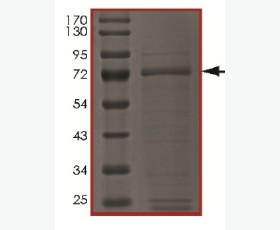Recombinant Human Bactericidal Permeability-Increasing Protein/BPI/CAP57
| Product name: | Recombinant Human Bactericidal Permeability-Increasing Protein/BPI/CAP57 |
| Source: | Human Cells |
| Purity: | Greater than 95% as determined by reducing SDS-PAGE. |
| Buffer Formulation: | Lyophilized from a 0.2 μm filtered solution of 20mM PB,150mM NaCl,pH7.4. |
| Applications: | Applications:SDS-PAGE; WB; ELISA; IP. |
| Storage: | Avoid repeated freeze/thaw cycles. Store at 2-8 oC for one month. Aliquot and store at -80 oC for 12 months. |
| UOM: | 100ug/50ug/200ug/1mg/1g |
| Source | Human Cells |
| Description | Recombinant Human CAP57 is produced by our Mammalian expression system and the target gene encoding Val32-Lys487 is expressed with a 6His tag at the C-terminus. |
| Names | Bactericidal permeability-increasing protein,BPI,CAP57 |
| Accession # | P17213 |
| Formulation | Lyophilized from a 0.2 μm filtered solution of 20mM PB,150mM NaCl,pH7.4. |
| Shipping |
The product is shipped at ambient temperature. |
| Reconstitution |
Always centrifuge tubes before opening. Do not mix by vortex or pipetting. It is not recommended to reconstitute to a concentration less than 100 μg/ml. Dissolve the lyophilized protein in ddH2O. Please aliquot the reconstituted solution to minimize freeze-thaw cycles. |
| Storage |
Lyophilized protein should be stored at < -20°C, though stable at room temperature for 3 weeks. Reconstituted protein solution can be stored at 4-7°C for 2-7 days. Aliquots of reconstituted samples are stable at < -20°C for 3 months. |
| Purity |
Greater than 95% as determined by reducing SDS-PAGE. |
| Endotoxin | Less than 0.1 ng/µg (1 IEU/µg) as determined by LAL test. |
| Amino Acid Sequence |
VNPGVVVRISQKGLDYASQQGTAALQKELKRIKIPDYSDSFKIKHLGKGHYSFYSMDIREFQLPS SQISMVPNVGLKFSISNANIKISGKWKAQKRFLKMSGNFDLSIEGMSISADLKLGSNPTSGKPTI TCSSCSSHINSVHVHISKSKVGWLIQLFHKKIESALRNKMNSQVCEKVTNSVSSKLQPYFQTLPV MTKIDSVAGINYGLVAPPATTAETLDVQMKGEFYSENHHNPPPFAPPVMEFPAAHDRMVYLGLSD YFFNTAGLVYQEAGVLKMTLRDDMIPKESKFRLTTKFFGTFLPEVAKKFPNMKIQIHVSASTPPH LSVQPTGLTFYPAVDVQAFAVLPNSSLASLFLIGMHTTGSMEVSAESNRLVGELKLDRLLLELKH SNIGPFPVELLQDIMNYIVPILVLPRVNEKLQKGFPLPTPARVQLYNVVLQPHQNFLLFGADVVY KVDHHHHHH
|
| Background | Bactericidal permeability-increasing protein(BPI for short), is a secreted protein which belongs to the BPI/LBP/Plunc superfamily, BPI/LBP family. It exists as a monomer or a disulfide-linked homodimer. The cytotoxic action of BPI is limited to many species of Gram-negative bacteria. This specificity may be explained by a strong affinity of the very basic N-terminal half for the negatively charged lipopolysaccharides that are unique to the Gram-negative bacterial outer envelope. BPI has antibacterial activity against the Gram-nagative bacterium P.aeruginosa, and this activity is inhibited by LPS from P.aeruginosa. |














